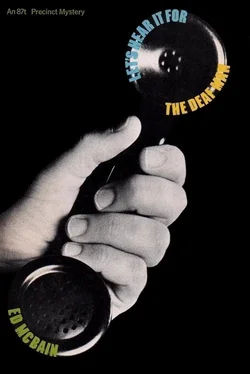“Might she have been here while you were away? Your mother?”
“What for?”
“I don’t know. Just to look in...”
“No.”
“Water the plants...”
“We don’t keep plants,” Angieri said.
“Besides, my mother’s eighty-four years old,” Mrs. Angieri said. “She hardly ever leaves Riverhead. That’s where she lives.”
“Might she have given the key to anyone else?”
“I don’t think she even remembers she has a key. We gave it to her years ago, when we first moved in. I don’t think she’s ever used it.”
“Because, you see,” Kling said, “there are no marks anywhere. So it’s reasonable to assume the man came in with a key.”
“Well, I don’t think it was Mr. Coe,” Angieri said.
“Who?”
“Mr. Coe. The super. He wouldn’t do something like this, would he, Marie?”
“No,” Mrs. Angieri said.
“I’ll talk to him, anyway,” Kling said. “The thing is, there’ve been twelve burglaries on this same block, and the M.O.’s been the same — the modus operandi — it’s been the same in each one, no marks, no signs of entry. So unless there’s a ring of burglars who’re all building superintendents...” Kling smiled. Mrs. Angieri smiled with him. He reminded her of her son, except for the hair. Her son’s hair was brown, and Kling’s hair was blond. But her son was a big boy, over six feet tall, and so was Kling, and they both had nice boyish smiles. It made her feel a little better about having been robbed.
“I’ll need a list of what was taken,” Kling said, “and then we’ll...”
“Is there any chance of getting it back?” Angieri asked.
“Well, that’s the thing, you see. We’ll get the list out to all the hockshops in the city. Sometimes we get very good results that way. Sometimes, though, the stuff’s gotten rid of through a fence, and then it’s difficult.”
“Well, it isn’t likely that he’d take valuable jewelry to a hockshop, is it?”
“Oh, yes, sometimes,” Kling said. “But to be honest with you, I think we’re dealing with a very high-caliber thief here, and it’s my guess he’s working with a fence. I could be wrong. And it won’t hurt to let the hockshops know what we’re looking for.”
“Mmm,” Angieri said doubtfully.
“I meant to ask you,” Kling said. “Was there a kitten?”
“A what?”
“A kitten. He usually leaves a kitten.”
“Who does?”
“The burglar.”
“Leaves a kitten?”
“Yes. As a sort of calling card. A lot of these thieves are wise guys, you know, they like to think they’re making fools of honest citizens. And the police, too.”
“Well,” Angieri said bluntly, “if he’s committed twelve burglaries so far, and you still haven’t caught him, I guess he is making fools of you.”
Kling cleared his throat. “But there was no kitten, I gather.”
“No kitten.”
“He usually leaves it on the bedroom dresser. Tiny little kitten, different one each time. Maybe a month old, something like that.”
“Why a kitten?”
“Well, you know, cat burglar, kitten, that’s his idea of a joke, I guess. As I said, it’s a sort of calling card.”
“Mmm,” Angieri said again.
“Well,” Kling said, “would you like to tell me what’s missing, please?”
The superintendent was a black man named Reginald Coe. He told Kling that he had been working here in the building ever since his discharge from the United States Army in 1945. He had fought with the infantry in Italy, which was where he’d got the leg wound that caused his noticeable limp. He now received a pension that, together with his salary as building superintendent, enabled him to provide adequately for his wife and three children. Coe and his family lived in a six-room apartment on the ground floor of the building. It was there that he talked to Kling in the waning hours of the afternoon, both men sipping beer at a spotlessly clean enamel-topped table in the kitchen. In another room of the house the Coe children watched an animated television program, their shrill laughter punctuating the conversation of the two men.
In the Cops-Bending-Over-Backwards Department, Reginald Coe had a great deal going for him. He was black, he was a wounded war veteran, he was a hard-working man, a devoted husband and father, and a genial host. Any cop who did not respond to a man like Coe had to be a racist, a traitor, an ingrate, a loafer, a home wrecker, and a bad guest. Kling tried to be fair in his questioning, but it was really quite impossible to remain unprejudiced. He liked Coe immediately, and knew at once that the man could not have had anything at all to do with the burglary upstairs. But since Coe possessed a duplicate key to the apartment, and since even angelic cherubs have been known to clobber their mothers with hatchets, Kling went through the routine anyway, just so he’d have something to do while drinking the good cold beer.
“Mr. and Mrs. Angieri tell me they left for Jamaica on the twenty-sixth of March. Does that check out with your information, Mr. Coe?”
“That’s right,” Coe said, nodding. “They caught a late plane Friday night. Told me they were going. So I’d keep an eye on the apartment. I like to know who’s in the building and who isn’t.”
“ Did you keep an eye on the apartment, Mr. Coe?”
“I did,” Coe said, and lifted his beer glass and drank deeply and with obvious satisfaction.
“How?”
“I stopped up there twice.”
“When was that?”
“First time on the Wednesday after they left, and again last Wednesday.”
“Did you lock the door after you?”
“I did.”
“Did it look as if anyone had been in there?”
“Nope. Everything was in its place, all the drawers closed, no mess, no nothing. Not like they found it when they got home last night.”
“This was Wednesday, you say? When you were in there?”
“Yes. Last Wednesday.”
“That would be the...” Kling consulted his pocket calendar. “The seventh of April.”
“If that’s what it says there. I wouldn’t know the exact date.”
“Yes, the seventh.”
“Then that’s when it was,” Coe said, and nodded.
“Which means the place was hit sometime between then and last night. Did you see any strangers in the building during that time?”
“No, I didn’t. I try to keep a careful eye on what’s going on. You get a lot of crooks coming around saying they’re repairmen or delivery men, you know, and all they want to do is get in here and carry off anything that ain’t nailed down. I watch that very careful. Cop on the beat’s a good man, too, knows who lives in the neighborhood and who don’t, stops a lot of strangers on the street just to find out what they’re up to.”
“What’s his name, would you know?”
“Mike Ingersoll. He’s been on the beat a long time.”
“Yes, I know him,” Kling said.
“Started here around 1960, sometime around then. He’s younger than I am, must be in his late thirties. He’s a good cop, been cited for bravery twice. I like him a lot.”
“When did you discover the burglary, Mr. Coe?” Kling asked.
“I didn’t discover it. Everything was all right last time I went in there. Mr. and Mrs. Angieri discovered it when they got home last night. They called the police right off.” Coe drank more beer, and then said, “You think this is connected with the other ones on the block?”
“It looks that way,” Kling said.
“How do you think he gets in?” Coe asked.
“Through the front door.”
“But how?”
“With a key,” Kling said.
“You don’t think...”
“No.”
Читать дальше












